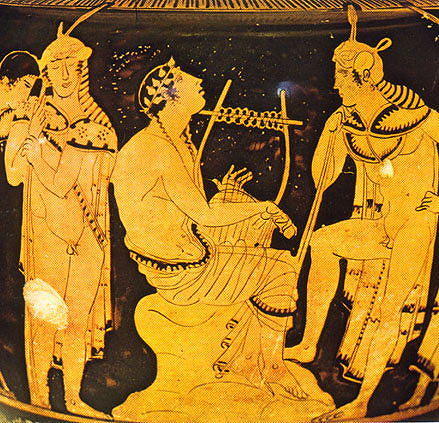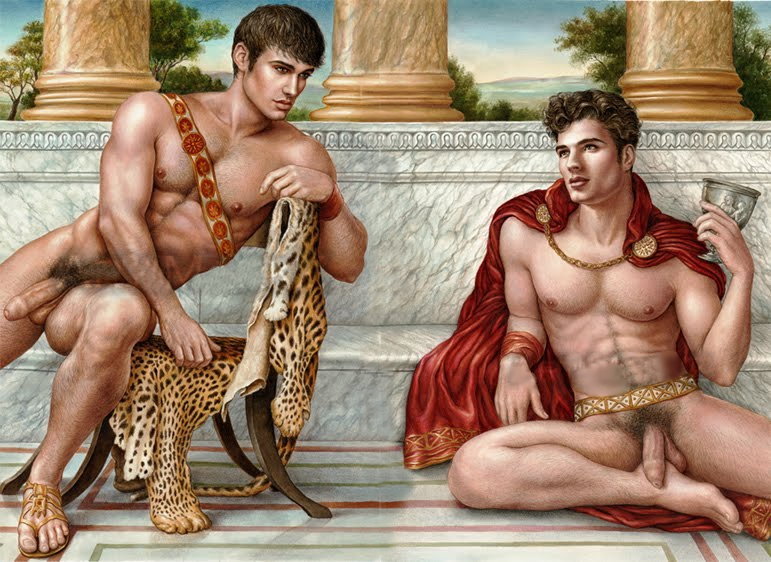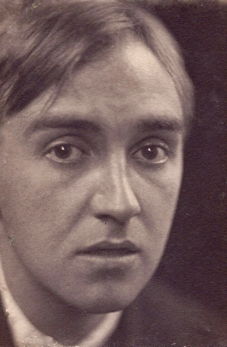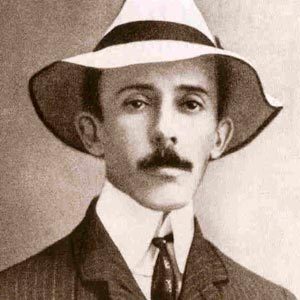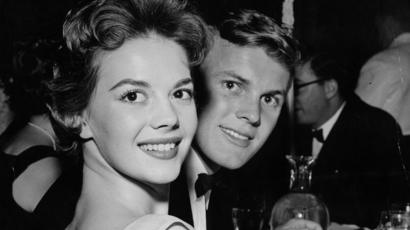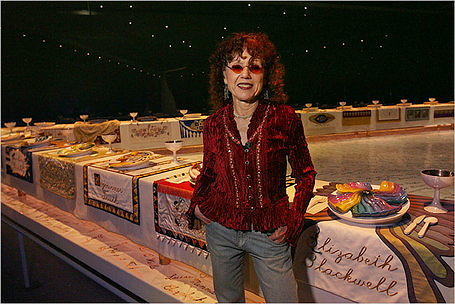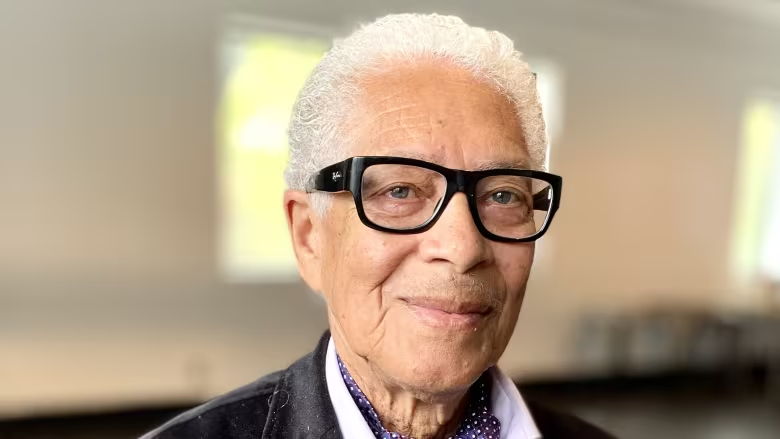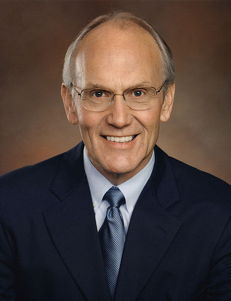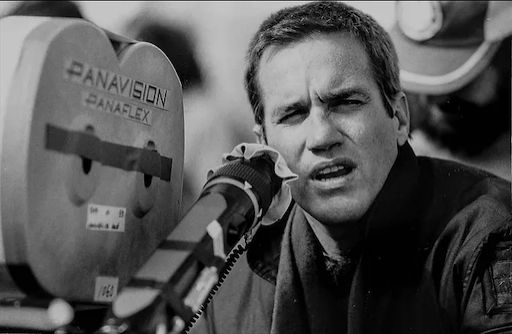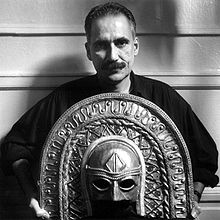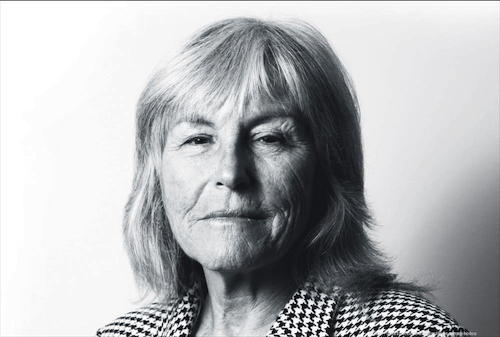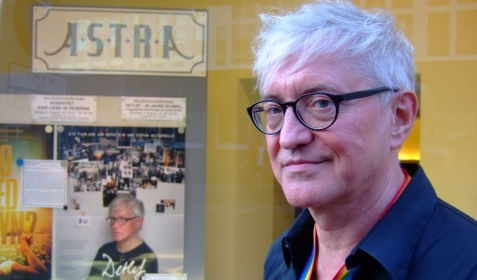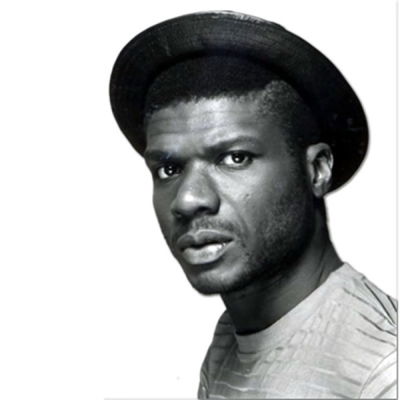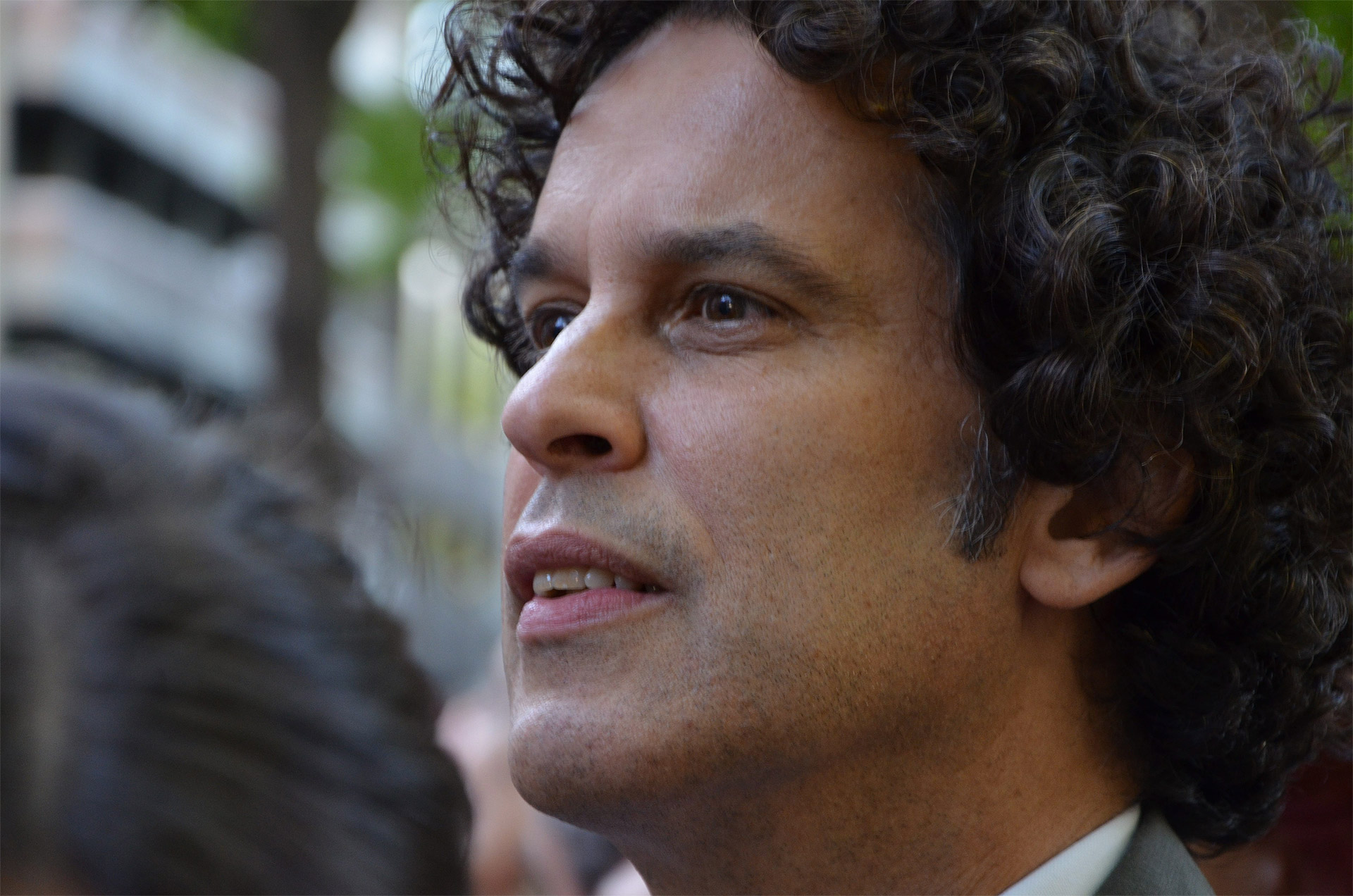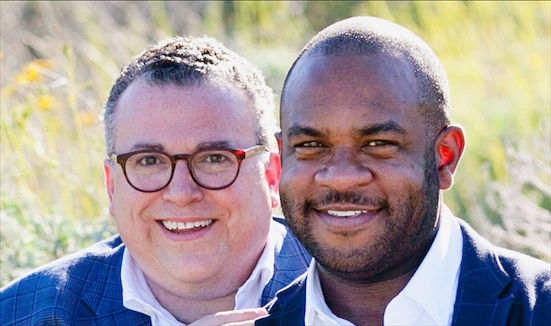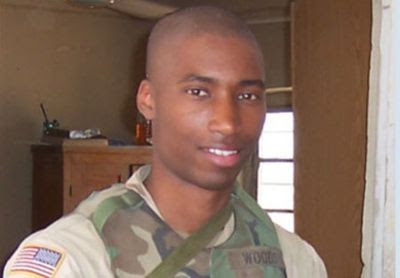|
presents THIS DAY IN GAY HISTORY based on: The White Crane Institute's 'Gay Wisdom', Gay Birthdays, Gay For Today, Famous GLBT, glbt-Gay Encylopedia, Today in Gay History, Wikipedia, and more …
Collected by Ted July 20 [{(o)}]|[{(o)}]|[{(o)}]|[{(o)}]| [{(o)}]|[{(o)}]
Orpheus was the son of Calliope and either Oeagrus or Apollo. He was the greatest musician and poet of Greek myth, whose songs could charm wild beasts and coax even rocks and trees into movement. He was one of the Argonauts, and when the Argo had to pass the island of the Sirens, it was Orpheus' distractions that prevented the crew from being lured to destruction. Orpheus also charmed Hades into allowing him into the underworld to recover his dead wife, Eurydice, but failed when he was leading her out of the underworld, by looking back to see if she was following, even though he had been warned that he must not look back. This much of the legend of Orpheus is fairly certain. It's the final days of Orpheus, however, that are the subject of varying stories. One such version justified Orpheus' inclusion here. The celebrated Thracian musician became a follower of Dionysius and, it is believed, soothed the Argonauts with means other than mere melodies, thus introducing homophile love into Greece. As a result, Orpheus was soundly hated by Aphrodite who considered him a competitor and rival. Orpheus met his end at the hands of the women of Thrace who, because the handsome hunk refused to pay them any attention, tore him to pieces.
356 BC – Alexander The Great is born in Macedonia (d.323 BC). One of the most successful military commanders in history, undefeated in battle, by the time of his death he had conquered most of the world known to the ancient Greeks. Alexander's love of Hephaestion, his companion fron boyhood, is the stuff of legend. It is said that on the night before the mother of Alexander, Olympias, was to be married to King Phillip of Macedonia, she dreamt that a thunderbolt struck her body and filled it with power. After the marriage, it is said that Phillip peeked into her chamber, and found her lying with a serpent, and that he afterward dreamt that her womb was sealed and that a lion dwelled within her. And on the night that he was born the great Temple at Ephesus was burned to the ground by a vandal, because the goddess Artemis was away, assisting with the birth of Alexander the Great. He was considered to be the son of Zeus, and this divine origin was what was given as an explanation for the unprecedented conquests that he accomplished. In Alexander's youth, Aristotle, a student of Plato, educated him, along with his following of young princes, who were later serve as his generals, and the founders of great dynastic monarchies of the Hellenistic world. Foremost of these princes was his lover, the ever-loyal and devoted Hephaestion. In one of their first battles, while Phillip was still king, the young Alexander proved himself by defeating the Sacred Band of Thebes, the army of homosexual lovers who were the most famous and courageous warriors of their time. Alexander is said to have wept at their destruction, and buried them with honor, erecting a statue of a Lion over their grave. Alexander would later go one to conquer the entire Eastern world, Asia Minor, Syria, Judea, Egypt, and all of Persian, as far East as India. The Empire of Alexander spread Greek culture throughout the world, and made the communication of far-distant ideas possible so that the new Hellenistic culture that he created, was a combination of classical Greece and of the exotic cultures that were imported from every corner. It was the death of Hephaestion, his life's greatest love, that shattered his will & mind. It was in drunken mourning that he destroyed his health & his body's abilities to defend itself against the various prevalent diseases & the after-effects of his battle wounds. Without Hephaestion Alexander could not find a way to go on. Today we use terms like life partner or lover which hardly convey the depth of connection and mutual support between two amazing commanders & leaders of men, Alexander and Hephaestion. Alexander had other unions, like many rulers since, both of attraction and political expediency. But his attraction was born out of admiration rather than carnal appeal. In fact he was known for aggressively criticising those who offered him beautiful youths or concubines solely for their appearance, believing, as his tutor Aristotle did, that such unions debase the human spirit and can serve no good. His relationships even confused his own people; his marriage to Roxane and his choice of her as mother to the heir was as much an expression of his cultural aspirations as it was his free will. He saw her as the pinnacle of beauty in body and spirit of the lands that bore her, whilst his men could not help but see her people as uneducated barbarians, fit only to civilise & rule over. But in his relationship with Hephaestion he had someone who had always known his innermost dreams as well as nightmares, who understood his highest ideals and could see his greatest doubts, who could command forces and inspire men enough to be his right hand in battle and be brilliant enough to be trusted lead whole armies in Alexander's name whilst always trusting to Alexander's judgement, an upholder of Alexander's many sometimes bewilderingly actions and counsellor & comfort on long cold nights filled with besieging misgivings; both unfailing support and a shelter from the storm, as a true soul mate should be. In their relationship not only did Alexander find sympathy and understanding, it was in the company of someone he'd known all his life and been educated with, but whom he could spiritually see as a true reflection of everything the beliefs of the time stated a man should aspire to be, in education, culture, reason, will, physical perfection, bearing and appearance. Hephaestion was as good a man as Alexander could ever wish to be had not the gods made him who he was tragically destined to be. In Alexander's own word at the confusion of Darius' daughter Stateira on initially mistaking Hephaestion for Alexander (due to his bearing and appearance): "He, too, is an Alexander". The king's Companions, whatever their personal allegiances, could only agree. In losing Hephaestion, Alexander lost his direction and refuge and, ultimately, his life.
1845 – France: In Paris, a mob attacks a group of about 50 men arrested by police in a sweep of the Tuileries Gardens, a popular gay cruising area.
1871 – Herbert Pollitt, also known as Jerome Pollitt (d.1942), was a patron of the arts and on-stage female impersonator who performed as Diane de Rougy (a homage to Liane de Pougy). He became notorious as an Cambridge undergraduate due to his taste for Decadent art and literature, and was immortalised as the eponymous hero of an E.F. Benson novel in 1896. He became a very close friend of the artist Aubrey Beardsley, and had a brief but significant relationship with the occultist Aleister Crowley. Following his time at Cambridge, Pollitt moved to London and saw service in the First World War as a lance-corporal. Pollitt was the son of Charles Pollitt, the proprietor of The Westmorland Gazette and his wife, Jane. From 1889 he studied at Trinity College, Cambridge, gaining his BA in 1892 and his MA in 1896. He became president of Footlights, the Cambridge University Dramatic Club. He was described as one of the most notorious and talked-about undergraduates of his tenure, his rooms furnished with pictures by Beardsley, James Abbott McNeill Whistler, and Félicien Rops, and his bookshelves stocked with Decadent works. Ultimately, he failed to qualify as a doctor. In late 1897, he decided to be known as Jerome Pollitt. 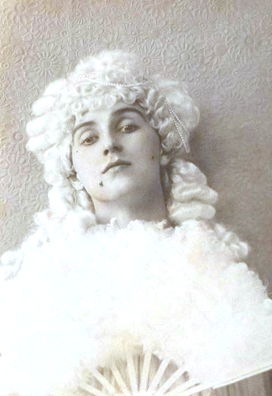 Pollitt as de Rougy The name of Pollitt's female alter-ego, Diane de Rougy, was inspired by Liane de Pougy, a vedette at the Folies Bergère who also had a reputation as one of Paris's most beautiful and notorious courtesans. Performance wise, however, de Rougy's noted scarf-dancing was more like that of the American dancer Loie Fuller. As the Footlights were largely a masculine establishment, female impersonation was not uncommon, but de Rougy became particularly renowned for her performances and as much a local Cambridge celebrity as Pollitt himself. She danced in two plays by Arthur Pilkington Shaw for Footlights, and it was claimed that her performances made women jealous. In October 1897, following his return to Footlights to perform as Diane de Rougy, Pollitt met Aleister Crowley, and the two swiftly entered into a relationship. Crowley wrote that "I lived with Pollitt as his wife for some six months and he made a poet out of me." The relationship ultimately failed through Pollitt's unwillingness to take part in Crowley's interest in mysticism. This led to a quarrel, in which Crowley informed Pollitt that he did not fit into his plans for his life. Crowley quickly regretted the break-up, but they did not reconcile, and an accidental snub on Bond Street ultimately estranged Pollitt from his former lover. Crowley remained attached to Pollitt, who inspired a number of sonnets and other poems, and immortalized him in his 1910 book on homosexual love, The Scented Garden of Abdullah the Satirist of Shiraz. Finally, in his autobiography The Confessions of Aleister Crowley, he recalled the end of the relationship as a "lifelong regret." The exact nature of Pollitt's relationship with Aubrey Beardsley is unclear, although the two men shared a keen interest in erotica and transvestism. Beardsley referred to Pollitt as "My best good friend," and created a bookplate specially for him that seemed to echo Pollitt's vision of his female alter-ego. Pollitt also sent risqué photographs of himself to their mutual friend Oscar Wilde. In 1901 Pollitt was living in Marylebone, London. In August 1914 following the outbreak of World War I, he enlisted in the Royal Army Medical Corps and served as a Lance-Corporal of the 9159th regiment. He died in 1942.
1873 – Is gay Brazilian, Alberto Santos-Dumont (d.1932) – rather than the American brothers Wilbur and Orville Wright – actually most responsible for modern aviation? Such a question leads to what we know of the Brazilian dandy who is regarded by many as the father of modern aviation and the inventor of the airplane. While his sexuality is a matter of controversy, suspicions of his homosexuality may have contributed to a neglect of his achievement. Born in Brazil, Santos was the son of a coffee tycoon father and an upper-class mother. His father's interest in high-tech machinery for use in the coffee trade led to Santos's early fascination with trains and steam-powered locomotives, which he learned to drive before the age of 10. The novels of French science-fiction writer Jules Verne were among the boy's favorite childhood reading. As a teenager in 1888 Santos made his first aerial ascent in a tethered balloon at the São Paolo state fair. Two years later he accompanied his father on a trip to Paris, where he saw for the first time the newly-invented gasoline engine. In 1892 Santos's father, disabled by an industrial accident, gave Alberto his own fortune, which the young inventor used to finance his research. He embarked for Paris to study mechanical arts and engineering. His father allegedly hoped that the experience of Paris would "make a man out of him." Since the price of a flight-capable balloon was prohibitive, Santos-Dumont bought himself an automobile (he is credited with bringing the first gasoline-powered automobile to Brazil on one of his trips home). When he learned that the Parisian balloon-maker Lachambre had reduced the cost of his balloons, Santos purchased one and made his own first ascent, accompanied by Lachambre in1898. His twin interests in balloon flight and gasoline-powered engines led Santos-Dumont to construct his first two dirigibles. His first flight, in the craft he called No. 1, ended with his barely escaping injury when the vehicle struck tree branches. For his No. 2 and No. 3 balloons, Santos—despite the obvious risk of fire from flammable gas—suspended a rigid frame from the gas bag, into which he put a gasoline engine. Utilizing this design in his dirigible No. 6, Santos achieved the first powered air flight known to history—at least in Europe. Santos's success made him an overnight sensation in Paris, leading petroleum baron Henry Deutsch de la Muerthe to offer a 100,000-franc prize to whoever could leave Parc Saint Cloud under his power, circumnavigate the Eiffel Tower, and return in less than 30 minutes. After several tries, Santos-Dumont made the prescribed trip on October 19, 1901 in his dirigible No. 6 and received the Deutsch Prize. Photographs show the cigar-shaped craft above the 100-story tower, with Parisian throngs below waving their hats in admiration of le petit Santos (who stood only 5'1" and weighed only 100 pounds). 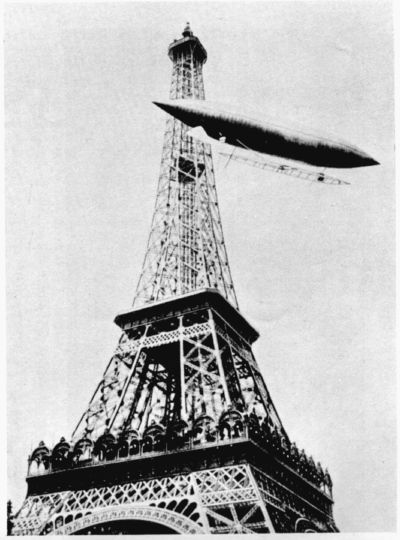 Of the two aircraft with the number 14, it was the 14B (or 14-bis, as it is known by its French name) that became Santos's first heavier-than-aircraft to actually fly. On October 23, 1906, he won the Ernest Archdeacon Cup for a flight of at least 25 meters by flying about 50 meters under his own power. Several weeks later, on November 12, he flew a distance of 220 meters, winning the Aero Club's 1500-franc prize for a self-propelled flight over 220 meters. Santos's airplanes took off and landed under their own power, while the Wright brothers' December 17, 1903 flight at Kitty Hawk, North Carolina, revealed to the public two years later, had to be launched into the air by a catapult. Thus, many aviation historians credit Santos as the inventor of the airplane. Santos again commanded public acclaim with his Demoiselle ("Little Lady") model monoplanes, Nos. 19, 20, 21, and 22, in which he flew to visit friends' distant chateaux and set records for speed and distance. Unlike other aviation pioneers, including the Wright brothers, who conducted their research in secrecy and who patented each step, Santos distributed the blueprints and plans of his aircrafts to the public and allowed them to be published in Popular Mechanics. Regarding them as a contribution to the cause of peace, Santos never patented his inventions. He hoped that air travel would help unite mankind and usher in a period of unprecedented prosperity. The open-source technology that Santos pioneered formed the template for over 200 similar aircraft subsequently patented with minor alterations, including that of German aviation pioneer Anthony Fokker. On September 18, 1909, Santos made his last flight in his small, simple, and light Demoiselle, which had become the first aircraft in history to be copied and serially produced. Whereas the Wright brothers apparently lived conventional Midwestern lives (though like Santos they never married), the Brazilian pioneer lived the life of a fin-de-siècle Parisian aesthete, always dressed to the nines and impeccably mannered. Santos's flair made him the toast of Parisian society and a beloved hero of the people. By 1910, however, Santos was already suffering from periodic depressions and was diagnosed with multiple sclerosis. Although he was not yet 40, he retired from active aviation and design. Santos retreated to his native Brazil, where he built a small chalet on a hillside. The house featured such then-exotic novelties as a speaking tube and a heated shower with running water. Santos's return to Brazil was intended to be a triumphant occasion; a dozen members of the Brazilian scientific community boarded a seaplane in order to welcome his ship. Unfortunately, the plane crashed, killing all aboard. This tragedy, as well as the use of airplanes in World War I and in the Brazilian Constitutional Rebellion, deepened Santos-Dumont's depression. On July 23, 1932, Santos hanged himself in a hotel room in the city of Guarujá in São Paulo. In Brazil and in France, Santos is celebrated as a national hero on a level with Thomas Edison or Benjamin Franklin in the United States. The tendency has been for Brazilians to deny Santos's homosexuality while celebrating his accomplishments and for English and American historians to admit his homosexuality while denying the singularity of his achievements. Given international aftemath of the Oscar Wilde trial, it is not surprising that little documentation of Santos's romantic and sexual interests survive. After the Wilde persecution, the inventor burned all of his diaries, letters, and papers, except for volumes specifically intended for publication.
Wood biographer and Hollywood screenwriter, Gavin Lambert, also confirms that Wood had studio-arranged dates with Gay or bisexual actors, the first of which was Nick Adams. Hunter in his autobiography elaborates on how a Hollywood studio's publicizing of a sham romance between two actors each under contract to it was a strategy to stimulate public desire for seeing that studio's forthcoming films. According to Lambert, Wood supported Gay playwright Mart Crowley in a manner that made it possible for him to write his play, The Boys In The Band.
1939 – Judy Chicago, American artist. Chicago's brilliant "The Dinner Party" now on permanent display in the Elizabeth Sackler Center Feminist Art at the Brooklyn Museum traces the herstory of great women and comprises a massive ceremonial banquet, arranged on a triangular table with a total of thirty-nine place settings, each commemorating an important woman from history. The settings consist of embroidered runners, gold chalices and utensils, and china-painted porcelain plates with raised central motifs that are based on vulvar and butterfly forms and rendered in styles appropriate to the individual women being honored. The names of another 999 women are inscribed in gold on the white tile floor below the triangular table. This permanent installation is enhanced by rotating biographical gallery shows relating to the 1,038 women honored at the table, Pharaohs, Queens and Goddesses is the first such exhibition.
Most prominent as a stage actor, he joined Halifax's Neptune Theatre company in 1972. He has since appeared in stage productions across Canada, including William Shakespeare's Hamlet, Richard III, A Midsummer Night's Dream, The Merchant of Venice and Henry VIII, Aeschylus' Agamemnon, Jean-Paul Sartre's The Flies, James Weldon Johnson's God's Trombones: Seven Negro Sermons in Verse, Tennessee Williams' Orpheus Descending and Cat on a Hot Tin Roof, and Djanet Sears' Harlem Duet and The Adventures of a Black Girl in Search of God. Since 2003, he has been a member of the Stratford Festival of Canada. He has also recorded and released an album, Walter Borden Reads Shakespeare's Sonnets to the Music of Fernando Sor, in collaboration with classical guitarist Paul Martell. Openly gay, he also wrote and performed his own autobiographical play Tightrope Time: Ain't Nuthin' More Than Some Itty Bitty Madness Between Twilight and Dawn, one of the first plays in the history of Black Canadian literature to directly present themes of male homosexuality. His later writing credits include Testifyin′ and Tellin′ It Like It Is.
1945 – Larry Craig is a former Republican politician from the U.S. state of Idaho. He served 18 years in the U.S. Senate (1991-2009), preceded by 10 years in the U.S. House, representing Idaho's first district (1981-91). His 28 years in the Congress rank as the second-longest in Idaho history, trailing only William Borah, who served over 32 years in the Senate. In addition to serving in Congress, Craig has been a member of the Board of Directors of the National Rifle Association since 1983. Craig has also been selected for induction into the Idaho Hall of Fame. On August 27, 2007, the Capitol Hill newspaper Roll Call revealed that Craig had been arrested for lewd conduct in the men's restroom at the Minneapolis-St. Paul International Airport on June 11, 2007, and entered a guilty plea to a lesser charge of disorderly conduct on August 8, 2007. Despite firmly stating that he was not gay and never has been gay, Craig announced his intention to resign from the Senate at a news conference on September 1, 2007, but later decided to finish the remainder of his term. Craig was not a candidate for re-election in 2008
1946 – Openly gay, Randal Kleiser is an American film and television director, producer, screenwriter and actor, best known for directing the 1978 musical romantic-comedy film Grease. Kleiser was born in Lebanon, Pennsylvania. Kleiser attended Radnor High School. As a freshman at the University of Southern California, Kleiser appeared in George Lucas' student film Freiheit. (Kleiser also lived in the house that Lucas was renting at the time.) Kleiser graduated in 1968. His award-winning Master's thesis film Peege launched his career. Kleiser directed several television movies in the mid-1970s, including 1975's Dawn: Portrait of a Teenage Runaway and 1976's The Boy in the Plastic Bubble, which starred John Travolta. Kleiser then was tapped to direct his first feature film, the 1978 film Grease, in large part because of Travolta's recommendation based on their work together on The Boy in the Plastic Bubble. Kleiser directed several more feature films, including The Blue Lagoon (1980) with Brooke Shields, White Fang (1991) and Honey, I Blew Up the Kid (1992). As a writer-producer, he was responsible for the surfing film North Shore (1987) for Universal Pictures. He also directed the thriller Shadow of Doubt (1998). In 1987, he had made a pact with upstart diversified film studio Management Company Entertainment Group to develop, direct and produce low-budget pictures that were financed by the studio, and he will shepherd indie projects of promising students and decided to build various international directors. Working in 70mm 3-D, he directed Honey, I Shrunk the Audience (1995) for the Disney theme parks in Anaheim, Orlando, Tokyo and Paris, re-teaming with most of the principal actors from Honey, I Blew Up the Kid.
1948 – Manuel Ramos Otero (d.1990) was a Puerto Rican writer. He is widely considered to be the most important openly gay twentieth-century Puerto Rican writer who wrote in Spanish, and his work was often controversial due to its sexual and political content. Ramos Otero died in San Juan, Puerto Rico, due to complications from AIDS. Many but not all of Ramos Otero's works focus on autobiographical characters of gay Puerto Rican men who are writers and live in New York City. In his work, Ramos Otero openly defends gay viewpoints and feminist positions. For him, homosexuality represented an outsider status; he did not advocate for full integration, but rather explored the situation of marginal subjects. He also discussed his HIV status and the prejudice and discrimination faced by people affected by AIDS.
1950 – American activist and politician Roberta Achtenberg has been a strong advocate for civil rights, especially those of gays and lesbians. In 1993 she became the first openly gay person to be confirmed by the United States Senate for a major political post, Assistant Secretary of Housing and Urban Development. Achtenberg's parents both immigrated to the United States, her father from the Soviet Union and her mother from Quebec. The Achtenbergs owned and ran a neighborhood grocery store in Los Angeles, where Roberta Achtenberg was born on July 20, 1950. While studying at Berkeley, she met and married David Chavkin, a law student. When her husband received a prestigious fellowship that took him to Salt Lake City, Utah, Achtenberg accompanied him and continued her studies at the law school of the University of Utah.During a separation from her husband, Achtenberg found herself attracted to a woman. She began reading about homosexuality but did not discuss her feelings with anyone. Achtenberg reunited with her husband after her graduation, but within two years the couple agreed to an amicable divorce. Thereafter, Achtenberg came out to her family but did not immediately reveal her sexual orientation publicly, fearing that it might be harmful to her career as a lawyer and educator. At the same time, she was becoming increasingly aware of the disadvantage at which gays and lesbians were often placed under the law on a wide variety of issues, including housing, employment, adoption, and privacy rights. Achtenberg joined the National Lawyers Guild in 1978 and began working on its Anti-Sexism Committee, which was creating a manual to help attorneys represent their gay and lesbian clients. The project eventually resulted in a wide-ranging treatise, Sexual Orientation and the Law (1985), which Achtenberg edited. In 1979 Achtenberg met Mary Morgan, a prominent lesbian attorney known in particular for her expertise in representing lesbian mothers in custody cases. In 1981, Morgan was appointed by Governor Jerry Brown to a judgeship in the San Francisco Municipal Court. The two lawyers became committed life partners in 1982. Four years later Morgan gave birth to their son, Benjamin Alexander Morgan Achtenberg, whom Achtenberg legally adopted. Achtenberg made her first foray into electoral politics with a run for the California State Assembly in 1988. She lost to an experienced and better-known opponent, but the election was closer than expected. The following year Achtenberg entered the race for the San Francisco Board of Supervisors. Although five at-large seats were open, the press tried to portray Achtenberg and Carole Migden, another lesbian candidate, as opponents for the same slot, on the assumption that voters would not elect two lesbians to the Board. As it turned out, however, they did. Her role as a lesbian elected official brought her national attention. She received letters from gays and lesbians around the country and also from parents of gay children who found hope in her success. "The ability to be in public life has been enormously positive to our movement, to our people," said Achtenberg, "and being able to contribute has been very gratifying." Achtenberg launched herself enthusiastically into Bill Clinton's campaign, helping to organize fund-raisers and other events. In introducing herself to the delegates, she proudly identified herself as a lesbian, a mother, and a Jew. As President-elect Clinton assembled his cabinet, he invited Achtenberg to be Assistant Secretary of Housing and Urban Development for Fair Housing and Equal Opportunity. Achtenberg would be the first openly gay person to receive Senate confirmation for an administration post. The process was long and grueling. Conservative Christian groups lobbied against her, and a number of conservative Senators attempted to block her appointment. Senator Jesse Helms spearheaded the opposition, making numerous public comments against Achtenberg, whom he described as a "damn lesbian," an "intolerant radical," and a "mean person" who "tried to bully the Boy Scouts." Immediately before the vote on confirmation Helms warned Achtenberg's supporters that "if any member of this Senate thinks this vote will go unnoticed by their constituents back home, they may find out otherwise" when they ran for reelection. The Senate debate included many allusions to what opponents called Achtenberg's "vendetta" against the Boy Scouts, prompting San Francisco Chronicle reporter April Lynch to write, "The Boy Scouts issue was brought up so often that some tourists sitting in the Senate visitors gallery became confused as to whether they were hearing debate on the Scouts or a HUD nomination." Achtenberg had been one of over fifty members of the board of directors of the United Way in San Francisco who voted unanimously not to give funds to the Boy Scouts because of their discriminatory policy against gay and bisexual boys. The Christian Action Network sent all Senators a tape of Achtenberg and Morgan riding in the 1992 Gay Pride Parade in San Francisco. The clip included a brief embrace by the couple. Helms referred to this as evidence of Achtenberg's "insane assault on family values" and castigated her for "demanding that society accept as normal a lifestyle that most of the world's major religions consider immoral and which the average American voter instinctively finds repulsive." The much-admired Senator Claiborne Pell was among those to speak in support of Achtenberg's confirmation, urging colleagues to use "simple standards of fairness and equal treatment" when considering the nominee. In the course of his remarks he also mentioned that his daughter, Julia Pell, was a lesbian and that he would not want her "barred from a government job because of her orientation." After Achtenberg's testimony before the Senate Banking, Housing and Urban Affairs Committee and the vigorous efforts of her proponents, especially Senators Dianne Feinstein and Barbara Boxer of California and Donald Riegle of Michigan, the full Senate confirmed her nomination by a vote of 58 to 31. To keep the family together, Morgan resigned her judgeship in California and moved to Washington, D.C. with Achtenberg and their son. Achtenberg left the post in 1995 to run for mayor of San Francisco. She served as Senior Vice President for Public Policy at the San Francisco Chamber of Commerce until January 2005. In 2000, she was appointed to the Board of Trustees of California State University by Governor Gray Davis, becoming chair of the Board in May 2006. On January 26, 2011, President Barack Obama named Achtenberg to the United States Commission on Civil Rights.
1950 – Detlef Stoffel, born in Bielefeld, Germany, is a German activist of the lesbian and gay movement, film director, and entrepreneur. Stoffel grew up in Herford, Germany, and, after graduating from high school in 1970, went to Miami in the United States for a year , where his aunt lived. There he met an American with whom he had his first homosexual relationship. Back in Germany, he then began to get involved in the gay movement. In 1977, Stoffel moved to Bielefeld, Germany, and started studying sociology and film studies at the local university. At the same time he worked, among other things, as a student assistant. Shortly after he first made contact with the gay movement in Germany, Stoffel founded the Homosexuality Bielefeld initiative group, a political homosexual group which organized various provocative actions. Some members founded Bielefeld's first homosexual shared apartment in 1975. As part of his studies, he directed the documentary Rosa Winkel? which dealt with homosexuality in the time of National Socialism . The film was completed in 1976 and shown the following year at the Mannheim International Film Week. As a thesis for film studies, however, the movie was not accepted. Stoffel dropped out without a degree. In 1977 Stoffel founded the first Bielefeld organic food store, Löwenzahn . Originally the workforce consisted exclusively of homosexuals. Other shops followed later, and from 1984 the company also supplied other natural food stores in the area as a wholesaler. In 2000, Stoffel sold the Löwenzahn company. Since then he has been working as a freelance management consultant. The directors Stefan Westerwelle and Jan Rothstein shot a documentary about Stoffel in 2010 and 2011. This is titled Detlef and premiered in 2012. The film took part in the Panorama competition at the 62nd Berlin International Film Festival. Also in 2012, the film was shown under the title Detlef - 60 years gay as part of the 16th Perlen - Queer Film Festival in Hanover.
1954 – Larry Levan, born Lawrence Philpot, (d.1992) was an American DJ best known for his decade-long residency at the New York City night club Paradise Garage, which has been described as the prototype of the modern dance club. He developed a cult following who referred to his sets as "Saturday Mass". Influential post-disco DJ François Kevorkian credits Levan with introducing the dub aesthetic into dance music. Along with Kevorkian, Levan experimented with drum machines and synthesizers in his productions and live sets, ushering in an electronic, post-disco sound that presaged the ascendence of house music. He DJ'd at Club Zanzibar in the 1980s as well, home to the Jersey Sound brand of deep house or garage house. Levan was born at Brooklyn Jewish Hospital, New York, to Minnie (née Levan) and Lawrence Philpot. He was born with a congenital heart condition and suffered from asthma from a very young age which would make him prone to fainting in class. Although a fragile young boy, he excelled in math and physics, leaving an impression on his teachers that he would become an inventor one day. He inherited his love for music from his mother who loved blues, jazz, and gospel music, and he was able to use a record player from the age of three. As his mother reflects, "I’d make him put records on so that we could dance together." While attending Erasmus Hall High School in the late 1960s and early 1970s, as the neighborhood of Flatbush transitioned to a predominantly African-American population due to white flight, the flamboyantly vanguard Levan (who dyed his hair orange nearly a decade before the ascendance of punk rock), was frequently bullied by his classmates. Eventually, he dropped out of high school and found assuagement in Harlem's longstanding ball culture as a dressmaker, where he first became acquainted with fellow designer and lifelong best friend Frankie Knuckles. He became infatuated with an idea of making the "music that would never stop" during a brief affair with hippie DJ David Mancuso, who introduced Levan to Manhattan's burgeoning underground downtown dance culture. Mancuso was the proprietor of The Loft, a minimally decorated, members-only dance club (uniquely situated in his home) where "punch, fruit and candy" were served in lieu of alcohol and music was processed by a state-of-the-art sound system. Levan got his start alongside Knuckles at the Continental Baths, as a replacement for the DJ from The Gallery, Nicky Siano, who briefly employed both men as decorators at The Gallery and taught them his pioneering three turntable technique. Accordingly, Levan's DJing style was influenced by Siano's penchant for Philadelphia soul and upbeat rock and Mancuso's jazz-inflected eclecticism; as with Mancuso, he briefly dated Siano during the epoch. While Knuckles was still trying to make his way in the New York club scene, Levan soon became a popular attraction at venues such as SoHo Place due to his "diva persona," which he had previously developed in the city's notoriously competitive black drag "houses". He was previously romantically involved with Nicky Siano (a fellow Brooklynite and Mancuso disciple) and Mel Cheren's ex-boyfriend. Frankie Knuckles and Levan were lifetime friends who were introduced to each other by a "drag queen called Gerald" when Levan was 15 years old. They both were active in the local drag scene.
1960 – Pedro Zerolo (d.2015) was a Spanish Venezuelan lawyer, politician and a town councilman of the city of Madrid, and a member of the Federal Executive Committee of the PSOE where he held the position of Secretary for Social Movements and Relations with NGOs. He was also a trustee of the Fundacion IDEAS, Spain's Socialist Party's think tank. Zerolo was also one of the most important LGBT activists in Spanish history and one of the biggest promoters of extending the right to marriage and adoption to homosexual couples in the country. Zerolo has become a gay icon among the Spanish LGBT community. Zerolo was born in Caracas, Venezuela, to a family native of the Canary Islands, concretely of the island of Tenerife. His father, Pedro González, lived in exile from the Francoist government there. Pedro González was the first mayor of San Cristóbal de La Laguna (Tenerife) in times of democracy and also well-known painter. Pedro Zerolo went on to study law at the University of La Laguna on Tenerife, where he spent his childhood and adolescence. After gaining his diploma, he moved to Madrid, where he continued his studies, focusing on comparative law. At the same time, he collaborated with Catholic priest Enrique de Castro in a project to help the people of the poor Madrid barrio of Entrevías. Through his work with law and politics, he went on to become one of the most well-known activists for the LGBT movement in fighting for marriage equality in Spain. On October 1, 2005, Zerolo married Jesús Santos, his partner of ten years, in a civil ceremony. In the same year he officiated in the marriage of politician Ángeles Álvarez and Teresa Heredero who became the first two lesbians to marry in Madrid. At the age of 55, Zerolo died from pancreatic cancer on 9 June 2015 in Madrid. On December 11, 2015 Radio Club Tenerife, Cadena Ser granted him the "Teide de Oro Award" posthumously. In July 2015 the City Council of Madrid decided to change the name of the Plaza de Vázquez de Mella to the Plaza de Pedro Zerolo in honor of him. The plaza was inaugurated on May 14, 2016 in the Madrid neighborhood of Chueca. The mayor of Madrid, Manuela Carmena; General Secretary of the PSOE, Pedro Sánchez; the General Secretary of the PSOE-Madrid, Sara Hernández; and members of the LGBTI collective were all present at the inauguration.
1973 – David Chalian is an American journalist and political analyst who serves as CNN's political director, where he oversees the political coverage across all of CNN's platforms. He is of Armenian Jewish heritage. After graduating from Northwestern University, Chalian joined NY1, a 24-hour cable news television channel based in New York City, and produced the nightly news program, Inside City Hall. He then worked as political director for ABC News and appeared as a political analyst on ABC World News Tonight, Nightline, and Good Morning America. At ABC, he created and co-anchored the daily political webcast, "Top Line". In January 2009, he won an Emmy Award as part of the team that produced ABC News's presidential inauguration coverage. He next worked as the political editor and an on-air political analyst for the PBS NewsHour and then as Vice President for Video Programming at Politico. Chalian served as Yahoo! News' Washington bureau chief but was fired from his position after he was overheard on a live microphone during an online broadcast from the 2012 Republican National Convention saying that Republican presidential candidate Mitt Romney and his wife Ann Romney were "not concerned at all" and "happy to have a party with black people drowning" during Hurricane Isaac. Chalian later apologized for his remarks, saying, "I am profoundly sorry for making an inappropriate and thoughtless joke. I was commenting on the challenge of staging a convention during a hurricane and about campaign optics. I have apologized to the Romney campaign, and I want to take this opportunity to publicly apologize to Gov. and Mrs. Romney." After Yahoo, he was hired as political director at CNN replacing Mark Preston. He often appears on-air as a political analyst on New Day and The Situation Room with Wolf Blitzer. Chalian lives in Washington, D.C. He has been married to Justin Tyler Bernstine since 2017. Bernstine serves as assistant dean for undergraduate academic services in the American University School of Communication.
1974 – Born in San Francisco, California, Simon Rex Cutright, better known as Simon Rex or Dirt Nasty, is an American actor, comedian, television host, recording artist, Record Producer and former VJ (media personality) . He is known for being an MTV VJ turned rapper/comedian with his alter ego, Dirt Nasty, which has received a cult following on social media websites. He also starred as Jeff Campbell in the first season of What I Like About You, as the clumsy George Logan in Scary Movie 3 and 4, and as Parker McClure in 5. Rex began his career by masturbating in a series of adult films oriented towards gay men. In 1993, at age 19, he appeared solo in scenes for 2 masturbation porn films, Young, Hard & Solo II; and Young, Hard & Solo III; and, in 1998, at 24, for 1 movie, Hot Sessions III; and 2 movies in 2000, Hot Sessions XII and Hot Sessions XIII. He was later hired as an MTV VJ but was subsequently let go when his adult past was revealed. 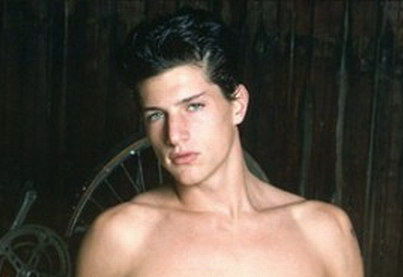 (Click for Full Monty) Rex soon after hit fame and popularity delving into acting and in 1999 was cast in the television show Jack & Jill, which ran for two seasons. He appeared as "Eli" in the TV show Felicity and television guest appearances followed including Baywatch, Everwood, and Summerland. In 2002, the pilot for the show What I Like About You was picked up by The WB. Rex starred in the first season. He later appeared on the Lifetime show, Monarch Cove which ran for 11 episodes in 2006. Rex entered the music industry as a rap artist after becoming friends with Mickey Avalon. Rex adopted his alter-ego "Dirt Nasty" and formed the rap group Dyslexic Speedreaders, along with Mickey Avalon, Andre Legacy, and Beardo.
1980 – (Anthony) Tony Woods is a veteran of Operation Iraqi Freedom, who was discharged from the United States Army in 2008 for violating the military's "Don't ask, don't tell" policy. In 2009, Woods ran for U.S. Congress in California's 10th congressional district to fill a vacant seat, in a bid to become the first openly-gay African American in Congress. He placed 4th, receiving 8% of a special election vote on September 1, 2009. He was part of the 2011-2012 Class of White House Fellows. Born on Travis Air Force Base, Woods was raised by a single mother who supported her family as a small business owner and housekeeper. As a child, Woods lived in both Fairfield and Vacaville in the East Bay region of California. Woods attended the U.S. Military Academy at West Point after graduation, having received a nomination from Congressman Vic Fazio. Woods was commissioned in the Army as a second lieutenant in the Armor branch and began the Armor Officer Basic Course at Fort Knox, Kentucky in July 2003. While there, he volunteered for his first deployment to Iraq to lead a platoon of National Guard soldiers. Woods deployed to the Diyala province of Iraq, where he served for eleven months. Upon return from his second deployment, the Army selected Woods to teach at West Point, an unusual appointment for so junior an officer. That year, he matriculated to the John F. Kennedy School of Government at Harvard University where he studied for a master's degree in public policy. During the summer of 2007, Woods co-led a group of thirty cyclists across the U.S. to raise money for Habitat for Humanity through a non-profit group known as Bike & Build. The trip took them from the Outer Banks of North Carolina to San Diego, California. The group raised over $130,000 and built homes in five different states during the course of the trip across the United States. Shortly after graduation from Harvard, Woods reported to Fort Knox, Kentucky for the Armor Captain's Career Course. Shortly thereafter, Woods outed himself as gay, and was subsequently discharged under the government's now repealed "Don't ask, don't tell" policy. For this decision, Woods was ordered to reimburse the Army for the $35,000 tuition paid on his behalf to attend Harvard. In December 2008, the U.S. Army completed the discharge process for Woods. On March 18, 2009, Woods declared his intention run for Congress in a special election to replace Rep. Ellen Tauscher, who was nominated by President Barack Obama to serve as Undersecretary of State for Arms Control and International Security. His campaign made it a high profile affair receiving national attention. However, his bid to become the first openly gay African-American elected to Congress ended when he lost a special election held on September 1, 2009, receiving under 9 percent of the vote.
1983 – The U.S. House of Representatives votes to officially censure Rep. Gerry Studds after becoming the first member of Congress to come out.
1987 – President Ronald Reagan appoints Larry Kramer, co-founder of Gay Men's Health Crisis, to a federal panel on HIV-AIDS. Like everything else Reagan did about HIV-AIDS, it was only about seven years too late.
1989 – Photographer Robert Mapplethorpe's show opens at Washington D.C.'s Project for the Arts after the Smithsonian Institution's Corcoran Gallery cancels it.
The Civil Marriage Act was introduced by Prime Minister Paul Martin's Liberal government in the Canadian House of Commons on February 1, 2005 as Bill C-38. It was passed by the House of Commons on June 28, 2005, by the Senate on July 19, 2005, and it received Royal Assent the following day. On December 7, 2006, the House of Commons effectively reaffirmed the legislation by a vote of 175 to 123, defeating a Conservative government motion to examine the matter again.
[{(o)}]|[{(o)}]|[{(o)}]|[{(o)}]| [{(o)}]|[{(o)}] |
